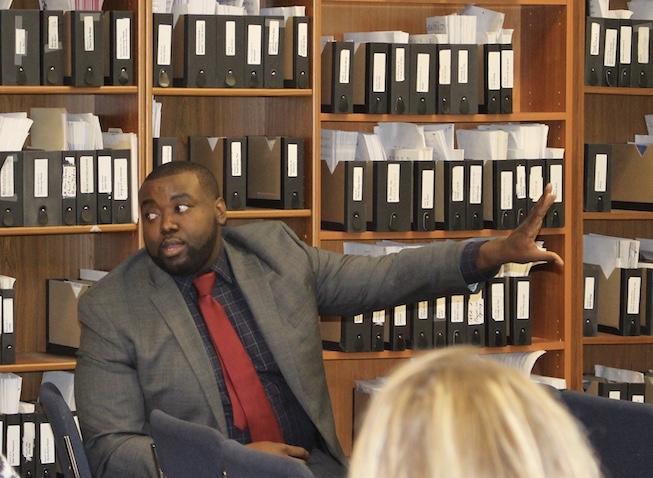Of the more than 4,000 lynchings of Black Americans that took place in the United States between 1865 and 1950, at least 43 cases occurred in Maryland.
George Mason University’s John Mitchell Jr. Program (JMJP), housed within the Carter School for Peace and Conflict Resolution, has been helping research several of these cases since 2019 to support the Maryland Lynching Truth and Reconciliation Commission. In October, they received news that they will be taking their research to the next level, thanks to a $300,000 Department of Justice grant they helped secure for the commission.

“States, in terms of their narratives, don’t shed light on these historic traumas,” said Carter School professor Charles Chavis, who is on the board of directors for the Maryland Lynching Memorial Project. “We wanted to give life to the relatives of victims whose loved ones had been forgotten.”
The grant, which is part of the Emmett Till Cold Case Investigations Program, will allow the commission and JMJP to supercharge their research.
“We work directly with the relatives in the sentence that we identify because we believe there is a direct line that can be drawn from the racial terror and lynchings of old to the existing racial terror and anti-blackness that we continue to see manifest in 2020,” Chavis said. “[With the grant] we’re now able to hire expert genealogists to help us track down the relatives [of lynching victims] so that they can be a part of the process.”
$100,000 is set aside for the communities and families of the victims for restorative justice reform, said Chavis, who founded JMJP to address narrative change and social transformation. The rest of the funds will go toward live reconciliation-style hearings.
“We work through each individual case in the various communities with key expert witnesses, relatives, descendants bearing witness to this history,” Chavis said.
Before that happens, Chavis said the Mason team helps with forensic reconstruction, which involves leaning on existing research and records to put together a mosaic of the case.
The Maryland State Archives have been key to their efforts.
“Students have been able to work directly with the research, documenting cases, doing census data, pulling death certificates, verifying biographical data and pulling together narratives of individuals,” Chavis said.
In the process, undergraduate and graduate students are gaining hands-on activist and research experience.
“What has been most important for me is being able to put some of what I learned about narrative approaches to racial and social justice into practice,” said master’s in conflict analysis and resolution student Audrey Williams, who is one of five students supporting the commission.
She said the project has also helped her better understand her role in creating change.
“You have to recommit to confronting anti-Black racism every day,” Williams said. “What that means for people who already benefit from the system is committing, with humility, to listening to and platforming the voices of colleagues, friends, and community members who have been harmed, and to becoming comfortable with being uncomfortable. The best place for this entire process to start is in our own hallways, classrooms and relationships.”
The programs and services offered by George Mason University are open to all who seek them. George Mason does not discriminate on the basis of race, color, religion, ethnic national origin (including shared ancestry and/or ethnic characteristics), sex, disability, military status (including veteran status), sexual orientation, gender identity, gender expression, age, marital status, pregnancy status, genetic information, or any other characteristic protected by law. After a thorough review of its policies and practices, the university confirms that it meets all federal mandates as articulated in federal law, as well as recent executive orders and federal agency directives.
